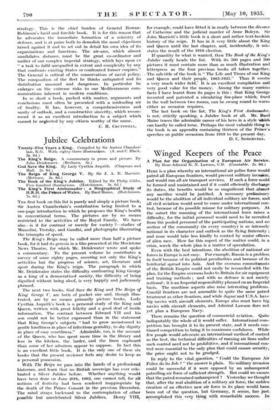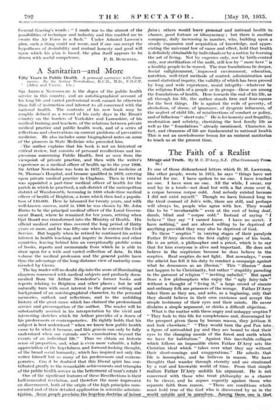Winged Keepers of the Peace
HERE is a plan whereby an international air police force would patrol all European frontiers, would prevent military invasion, and would run all air transport services. If such a force -could be formed and maintained and if it could efficiently discharge its duties, the benefits would be so magnificent- that. almost any sacrifice would be justified. A necessary preliminary would be the abolition of all individual military air forces, and all civil aviation would need to come under international con- trol, because of its possible misuse for military purposes. At the outset the manning of the international force raises a difficulty, for the initial personnel would need to be recruited from the pooled personnel of the participating nations, and no section of the community (in every country) is so intensely national in its character and outlook as the flying fraternity ; and none would take less kindly to control by senior officers of alien race. How far this aspect of the matter could, in a crisis, wreck the whole plan is a matter of speculation.
.Even with the best intentions, the abolition of national air forces in Europe is not easy. For example, Russia is a problem in itself because of its political peculiarities and because of its. territorial spread into Asia. And the overseas commitments of the British Empire could not easily be reconciled with the plan, for the Empire overseas looks to Britain for air equipment and training methods ; and with us defence is not merely national : it is an Imperial responsibility planned on an Imperial basis. The maritime aspects also raise interesting problems. Coastfil frontiers are not amenable to quite the same patrol treatment as other frontiers, and while Japan-and U.S.A. have big navies with aircraft elements, Europe also must have big navies with aircraft elements, and Admiral Lawson does not yet plan a European Navy.
There remains the question of commercial aviation. Quite indisputably the whole of it would suffer. International com- petition has brought it to its present state, and it needs con- tinued competition to bring it to maximum usefulness. While few people would advocate an international method of control as the best, the technical diffieulties of running air lines unaer such control need not be prohibitive, and if international con- trol were essential to the only plan that could ensure security, the price ought not to be grudged.
In reply to the vital_question, "Could the European Air Police do its Job ? " the answer is plain. No military invasion could be successful if it were opposed by an unhampered patrolling air fbree of sufficient strength. But could we ensure that the patrol remained unhampered ? Yesterday we thought that, after the real abolition of a military air force, the sudden creation of an effective new air force in its place would have. been out of the question, but Germany, it seems, has just - accomplished this very thing with remarkable success. In , _
General Goering's words : "I made-use to the utmost of the possibilities of technique and industry and this enabled me to create the Air Force in a flash." Under Admiral Lawson's plan, such a thing could not recur, and if one can accept the hypotheses of desirability and mutual honesty and good will upon which his pan is based, the plan itself appears to be



































































 Previous page
Previous page